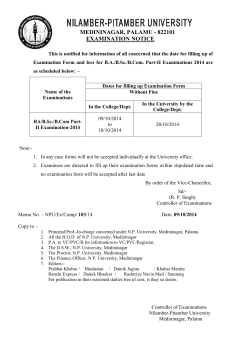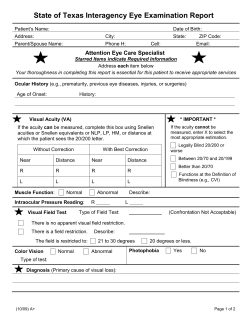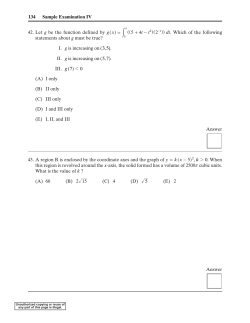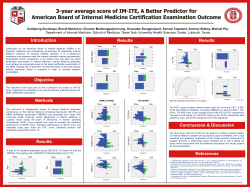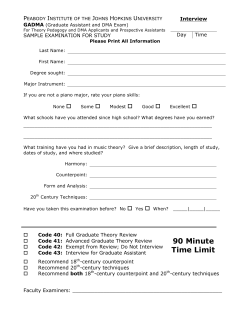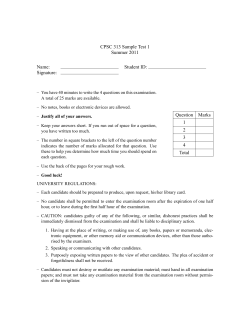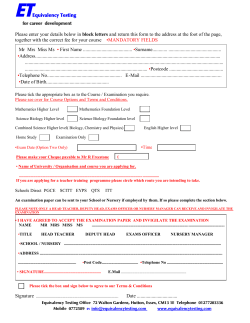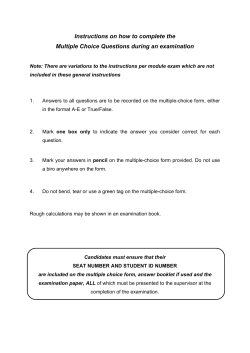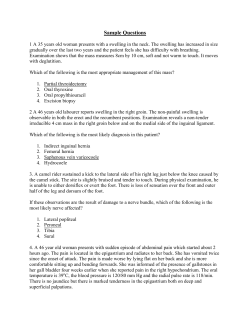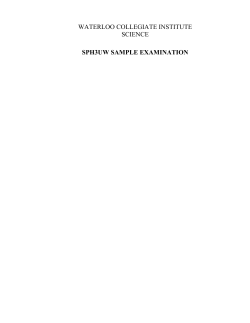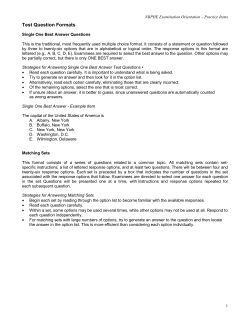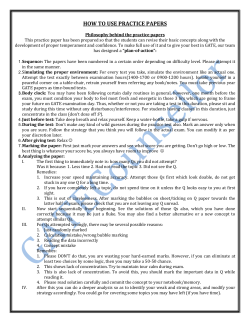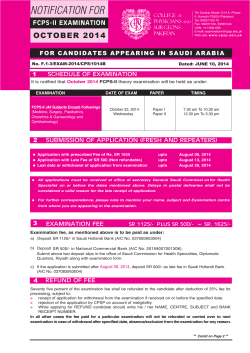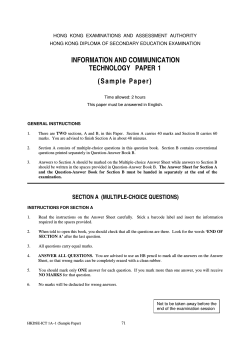
Internal Revenue Service Department of the Treasury
Internal Revenue Service Department of the Treasury Date: Employer Identification Number: Person to Contact/ID Number: Contact Telephone Number: Contact Fax Number: E-mail Address: Dear Sir or Madam: We are conducting a compliance check and are contacting you to learn about your Internal Revenue Code (“Code”) Section 457(b) plan. Our goal is to ensure that your plan is in compliance with the applicable law. The enclosed document, Request for Information, details the information we need. Please review and complete the attached Request for Information and return it to us within 15 days from the date of this letter. Attach a copy of this letter to the front of the Request for Information and mail it to the address shown in the heading of this letter or FAX it to 801-620-3259. You may also furnish any other documents or clarifying materials that you believe will be helpful for us to review. Failure to provide this information could result in an examination of your plan. Please provide an officer’s name, title, telephone number and most convenient time for us to call should we need to speak with someone regarding your organization. Printed Name: Title: _____________________________________ ________________________________ Telephone Number: Best Time to Reach You: _____________________________________ ________________________________ Date: E-Mail Address: _____________________________________ ________________________________ Letter 4663-F(Rev. 03-2013) Catalog Number: 62010S If you would like someone else to represent the plan during this compliance check, you must provide a written power of attorney. Form 2848, Power of Attorney and Declaration of Representative, may be used for this purpose. If you have any questions regarding this compliance check, please contact the person listed above or visit the Employee Plans Compliance Unit (EPCU) webpage at http://www.irs.gov/Retirement-Plans We are enclosing Publication 4386, Compliance Checks, which contains information about compliance checks. Thank you for your cooperation. Sincerely, Enclosures: Request for Information Publication 4386 Request for Information Please provide the information requested below regarding your Internal Revenue Code section 457(b) retirement plan and return this to us as requested in this letter. Name of Organization: Employer Identification Number: 1. Is your organization exempt from income tax under Code section 501(c)? Yes – under IRC §501(c)(____). (Please enter Code subsection number.) No Comments: __________________________________________________________ 2. Is your organization a state or local governmental unit exempt from income tax under Code section 115? Yes No 3. Does your organization sponsor an IRC §457(b) plan? Yes No We sponsor the following types of deferred compensation plans: _____________________________________________________________________ _____________________________________________________________________ _____________________________________________________________________ 4. Which workers are eligible to participate in your 457(b) plan? (include all that apply) Highly Compensated Employees Number of workers: _________ Management Employees Number of workers: _________ All Employees Number of workers: _________ Others - Explain: _____________________________________________________________________ _____________________________________________________________________ _____________________________________________________________________ _____________________________________________________________________ 5. Does your 457(b) plan allow participant loans? Yes – Plan allows for loans. Please provide a copy of the loan provisions from your plan. No – Plan does not allow for loans. 6. Does your 457(b) plan allow the age 50 catch-up contributions of IRC 414(v)? Yes – Plan allows for age 50 catch-up contributions. Please provide a copy of the catch-up provisions from your plan. No – Plan does not allow for age 50 catch-up contributions. 7. Does your 457(b) plan allow the special catch-up described in IRC 457(b)(3) during the last three years prior to reaching normal retirement age? Yes – Plan allows for special catch-up contributions. Please provide a copy of those provisions from your plan. No – Plan does not allow for special catch-up contributions. 8. Assets of non-governmental 457(b) plans must be available to the sponsor’s general creditors and cannot be held in a trust for the exclusive benefit of participants. Does your plan comply with this requirement? Yes – Plan assets are available to our general creditors. No – Plan contributions are held in a trust for the exclusive benefit of participants. 9. Has your plan filed for Top Hat exemption status with the Department of Labor? Yes – The plan has filed for Top Hat status with Department of Labor. Please provide a copy of the notice letter for Top Hat exemption status sent to Department of Labor. No – The plan has not filed with Department of Labor for Top Hat status. 10. During the last three years, have you made any hardship distributions from your 457(b) plan? Yes No Compliance Checks Examination, Audit or Compliance Check? Tax Exempt and Government Entities Division What is an examination? What is an audit? An examination is a review of an organization’s books and records. In addition an examination may involve the questioning of third parties to determine the organization’s tax liabilities. Another term for an examination is an audit. What is a compliance check? A compliance check is a review conducted by the IRS to determine the following: Whether an organization is adhering to recordkeeping and information reporting requirements. Whether an organization’s activities are consistent with their stated tax-exempt purpose. It is a review of information and forms that we require organizations to file or maintain – for example, Forms 990, 990-T, 940, 941, W-2, 1099, or W-4. The check is a tool to help educate organizations about their reporting requirements and to increase voluntary compliance. The 990 series of forms are used by tax-exempt organizations, including charities, private foundations and other nonprofit organizations, to provide information required by section 6033 of the Internal Revenue Code, which includes information about their programs and activities. Information on these returns is generally disclosable to the public as provided by law. It should be noted a compliance check is not an examination; it does not directly relate to determining a tax liability for any particular period. What occurs during a compliance check? At the beginning of a compliance check, we will inform the officer or director that the review is a compliance check and not an examination. We will not ask to examine any books and records or ask questions regarding tax liabilities. We may ask the organization whether they understand or have questions about filing obligations for required forms. We may also ask questions about an organization’s activities. If, during a compliance check, we decide an examination is appropriate, we will notify the organization that we are commencing an examination before asking questions related to tax liability. Is there a penalty for refusing to submit to a compliance check? No. The officer or director may refuse to participate in a compliance check without penalty. However, we have the option of opening a formal examination, whether or not the organization agrees to participate in a compliance check. How often can the IRS do compliance checks? Because a compliance check only reviews whether an organization is adhering to record keeping and information reporting requirements and/or whether an organization’s activities are consistent with its stated tax-exempt purpose and is not an examination, it is possible to have more than one compliance check for a tax year if facts and circumstances warrant. Department of the Treasury Publication 4386 (4-2006) Internal Revenue Service Catalog Number 38771G www.irs.gov
© Copyright 2025
